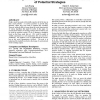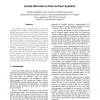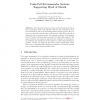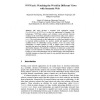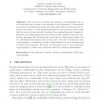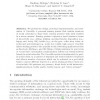DNIS
2005
Springer
14 years 5 months ago
2005
Springer
: A Peer-to-peer Data Network (PDN) is an open and evolving society of peer nodes that assemble into a network to share their data for mutual benefit. PDNs are enabled by distribu...
GROUP
2005
ACM
14 years 5 months ago
2005
ACM
People search for people with suitable expertise all of the time in their social networks – to answer questions or provide help. Recently, efforts have been made to augment this...
ICMCS
2005
IEEE
14 years 5 months ago
2005
IEEE
This paper describes our system that enables members of a social network to collaboratively annotate a shared media collection. The problem is important since online social networ...
HICSS
2005
IEEE
14 years 5 months ago
2005
IEEE
The Gnutella protocol requires peers to broadcast messages to their neighbours when they search files. The message passing generates a lot of traffic in the network, which degrade...
WAW
2007
Springer
14 years 5 months ago
2007
Springer
Social networks are ubiquitous. The discovery of close-knit clusters in these networks is of fundamental and practical interest. Existing clustering criteria are limited in that cl...
UM
2007
Springer
14 years 5 months ago
2007
Springer
Abstract. Recommender systems produce social networks as a side effect of predicting what users will like. However, the potential for these social networks to aid in recommending i...
SEMWEB
2007
Springer
14 years 5 months ago
2007
Springer
This paper develops a Semantic Web application, namely WorldWideWatch or WWWatch, in short. By employment of Semantic Web technologies, WWWatch analyses and visualizes social netwo...
MDAI
2007
Springer
14 years 5 months ago
2007
Springer
Abstract. The need for protecting the privacy of relationships in social networks has recently been stressed in the literature. Conventional protection mechanisms in those networks...
EUROSSC
2007
Springer
14 years 5 months ago
2007
Springer
Abstract. We present the design, prototype implementation, and evaluation of CenceMe, a personal sensing system that enables members of social networks to share their sensing prese...
ATAL
2007
Springer
14 years 5 months ago
2007
Springer
This paper proposes a new variant of the task allocation problem, where the agents are connected in a social network and tasks arrive at the agents distributed over the network. W...

